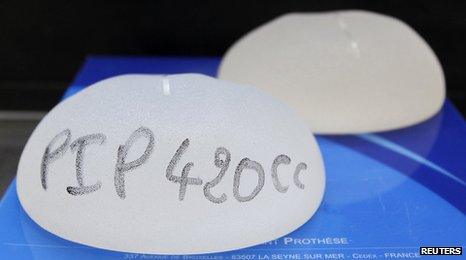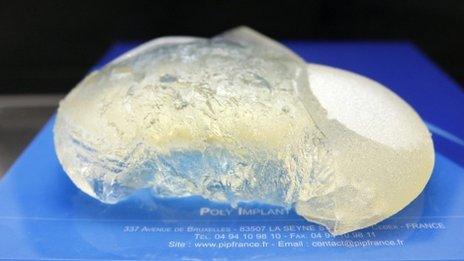'No long-term threat' from PIP breast implants
- Published

The final report into PIP breast implants has found that they aren't a long-term health threat.
The report says they aren't toxic and don't cause cancer, but agrees they do have double the rupture rate of other implants.
Forty-seven thousand British women are thought to have the implants, made by French company PIP (Poly Implant Prothese).
Routine removal isn't recommended but doctors say women with tenderness, soreness or lumpiness should speak to their surgeon or GP.
What is the problem with the PIP implants?
The British Association of Aesthetic Plastic Surgeons (Baaps) says the implants are made from cheaper industrial silicone, meant for use in mattresses, rather than in cosmetic medical procedures.
What is the potential risk?
Tests have shown the PIP silicone doesn't have a higher risk of being toxic than other implants.
There is also no increased risk of breast cancer when compared with other implants.
However, tests have shown the PIP implant covers do have a higher risk of rupturing, meaning the gel could leak and possibly cause some irritation and inflammation.
What is the government's advice on the implants?
Although they are "substandard", it says there is no danger and that routine removal is unnecessary.
Health Secretary Andrew Lansley has said anyone who's worried or wants more information should contact their surgeon or GP.
The final report on the implants says that after five years, the rupture rate is between 6% and 12%.
After 10 years, the rate is between 15% and 30%
Other breast implant brands have a failure rate between 10% and 14% after a decade.
Who pays if they need to be removed?
Anyone who has the implants fitted by the NHS can get them removed and replaced free of charge, even if they have not ruptured.
In Wales, the NHS will also replace those of private patients if the clinic refuses (95% of UK implants were fitted at private clinics).
In England and Scotland the NHS will remove implants of private patients but not replace them.
How many people are affected?
It's thought PIP sold 300,000 implants in 65 countries over 12 years.
More than half its exports went to South America, but the UK was also a big market for the firm and about 47,000 British women are believed to have the implants.
PIP was shut down last year by the French authorities.
At least 250 women are taking legal action against UK based clinics that fitted them with the implants.
- Published2 January 2012

- Published31 December 2011
